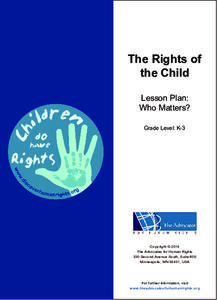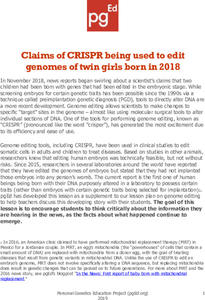Idaho Coalition
Teen Relationships
Collaborative activities teach adolescents to talk comfortably about teen issues. Class members identify eight factors of healthy relationships among friends, family, and boyfriends/girlfriends. These factors are then used to help...
National Energy Education Development Project
Great Energy Debate
If someone yelled for eight years and eight months, they could produce enough energy to heat one cup of coffee. A lesson on energy encourages scholars to research 10 different energy sources in groups before playing a game. Twenty...
Curated OER
Lesson Plan Outline for Rainbow Science
Young scientists study light reflection and refraction as they determine the critical angle, the rainbow angle, and color separation in rainbows. Teams record the data they collect in a shared spreadsheet and discuss results with the class.
Constitutional Rights Foundation
History of Immigration From the 1850s to the Present
The Statue of Liberty may embrace the huddled masses of the world, but has American society always joined in? After young historians read a passage about the history of American immigration in the 19th and 20th centuries, focusing on...
Constitutional Rights Foundation
Conducting a Panel Discussion and Civil Conversation
The final instructional activity in an 11-session study of immigration asks class members to engage in either a panel discussion or a civil conversation of the controversial legal and policy issues they have investigated as part of the...
Nuffield Foundation
Observing Earthworm Locomotion
One acre of land can contain more than a million earthworms. Scholars collect earthworms to observe their movements. Once placed on paper, the sound of movement often fascinates pupils. When placed on glass, the earthworm is unable to...
American Documentary
Confucianism in a Changing Society
The Last Train Home, a 2009 documentary about China's migrant factory workers, provides viewers with an opportunity to explore how China's emergence as a global manufacturing force is challenging Chinese traditional values like filial...
Missouri Department of Elementary
Happy, Sad, Scared and Mad: All Belong To Me
"What are feelings?" and "Why are feelings important to understand?" are the essential questions of a lesson that boosts self-awareness. Scholars discuss the four basic emotions—happy, sad, scared, and mad—in preparation for a creative...
EngageNY
Writing the Children’s Book: Day One
With a brief mini-lesson, scholars learn about using strong verbs, sensory details, and precise descriptions. Next, pupils continue working on their children's book storyboards before choosing their strongest pages for peer critiques.
Facing History and Ourselves
When Differences Matter
Jane Elliott's controversial blue eyes/brown eyes experiment detailed in the film A Class Divided leads to a discussion of privilege, social power, and opportunity. Viewers note how the children react to the experiment, share their...
Western Justice Center
Self Awareness
Being aware of one's perceptions and biases is especially important when involved in a conflict. After watching an introductory video and four scenarios, viewers write out how they would feel or react to each situation. The subsequent...
Advocates for Human Rights
The Rights of the Child
Dr. Seuss wrote " A person's a person, no matter how small." The elementary resource uses Dr. Seuss's book Horton Hears a Who to explore children's rights in an engaging way. Young academics listen to the story, participate in group...
Teaching Tolerance
Talking About Race and Racism
Set the stage for discussion in a thought-provoking instructional activity on racism. An informative resource prepares scholars to discuss the history of race and racism with a quiz, vocabulary, and guidelines. Academics discuss topics...
PBS
Out of the Shadows | Black America Since MLK: And Still I Rise
Two powerful video clips launch a study of race relations in the United States after the Selma, Alabama riots, the passage of the Votings Rights Act, and the riots in Watts, California.
Facing History and Ourselves
After Charlottesville: Public Memory and the Contested Meaning of Monuments
Are Civil War monuments a kind remembrance or a reminder of a dark past? The lesson focuses on the public's memory of the Civil War and the monuments that represent it. Young academics explore past efforts to change historical symbols...
Smithsonian Institution
Separate is Not Equal: Fight for Desegregation
Separate is not equal! An eye-opening lesson delves into the past to understand the fight for desegregation and how it impacted African American communities. Academics complete two one-hour lessons using documents, photographs, and...
Smithsonian Institution
Racism and Removal: Japanese Incarceration During World War II
During World War II people saw how far the government's control would go, but it was at the expense of its citizens. The resource brings the conditions of Japanese American internment camps to light using primary documents. Scholars...
Center for History Education
Freedom for All? The Contradictions of Slavery and Freedom in the Maryland Constitution
Freedom for the few! An interesting lesson focuses on the Maryland Constitution and its lack of freedom for African Americans. Scholars examine the premise of freedom for all—which only extended to a limited few. Academics complete...
Center for History Education
Fighting for Whose Freedom? Black Soldiers in the American Revolution
Fight for freedom! The instructional activity delves into the world of African American soldiers during the American Revolution. Scholars read documents, such as the Dunmore Proclamation, to understand how the British government treated...
Center for History Education
Japanese American Internment During World War II
World War II turned nations against each other and neighbors into enemies. An eye-opening lesson explores the dark past of Japanese-American internment camps during WWII. Scholars learn of the fear and distrust toward Asian Americans...
Personal Genetics Education Project
Claims of CRISPR Being Used to Edit Genomes of Twin Girls Born in 2018
Here is an activity that blends genetic technology, literacy skills, and critical thinking. Pupils review background information about cell lines and CRISPR by video and teacher-led discussion. Scholars collaborate to analyze two...
Personal Genetics Education Project
Genome Editing and CRISPR
Explore the excitement and ethical challenges of CRISPR and genetic-editing technology. Participants engage in do-nows, view a slideshow, and collaborate on scenarios about genetic editing. Group members analyze scenarios to generate...
Nebraska Department of Education
Mock Interviews
Completing a job application and sitting for an interview are essential parts of the job search process. High schoolers receive guidance as they fill out a job application and participate in mock interviews to prepare. They also access a...
Overcoming Obstacles
Clarifying Values
The fourth instructional activity in the Confidence Building module asks participants to think about what they value and how these values influence their decisions. Class members engage in activities that help them identify what they...
Other popular searches
- Character Education Respect
- Bulletin Board Ideas Respect
- Respect Activities for Kids
- Guidance Lessons on Respect
- Respect Lesson Plans
- Teaching Respect
- Respect Activities
- Self Respect
- Respecting Authority
- Respect Personal Space
- Respect Authority
- Respect for Authority

























